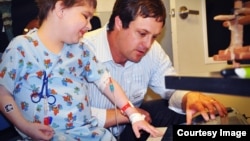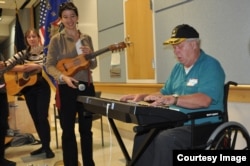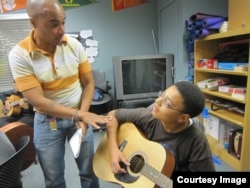SAN FRANCISCO —
Americans have been volunteering worldwide through the Peace Corps for more than 50 years. AmeriCorps, a domestic community development program, began 20 years ago.
More recently, deciding music and public service are natural partners, a man who helped lauch AmeriCorps created MusicianCorps, which recruits musicians and trains them as teachers and mentors.
"Music and arts more broadly are underutilized as a strategy for public good and social impact," said Kiff Gallagher. "And musicians and artists specifically, given the proper training and support, can be effective community leaders and be engaged in the civic social impact movement.”
As a young college graduate, Gallagher was part of the Clinton White House legislative team that created the community service program AmeriCorps. By night, he performed with a popular Washington, D.C. band.
Five years ago, after successful careers as an executive at socially responsible businesses and as a singer-songwriter, Gallagher realized that his twin passions - service and music - could be used to help Americans in need.
“Recognizing that music had been cut from schools and there was more and more data coming out about music as an intervention for veterans and Alzheimer’s and autism," he said, "I just thought this is a no-brainer, why is there no MusicianCorps?”
So he started MusicianCorps where musicians ply their trade in urban school settings, children’s hospitals, and senior assisted-living homes, and they help organize community jam sessions open to all.
Gallagher says what sets MusicianCorps apart from other music programs - what makes it so powerful - is that it is participatory. He recalls a MusicianCorps session at a veterans’ hospital. Afterwards, he says, the veterans were less depressed, in less pain and more relaxed.
“They’re making music. They’re playing drums, they are playing ukuleles, they are singing," he said. "So, it’s less about performance or traditional instruction and more about music-making. But again, in a veterans’ space, that’s not a musical outcome. That is a critical intervention that’s addressing one of the biggest problems we face right now in public health and that is veterans’ suicide.”
David Meletiche teaches an after-school guitar class in an Oakland neighborhood known for its high crime rate. Meletiche, who graduated with a Bachelor of Fine Arts degree, was thrilled to be hired by MusicianCorps.
Not only did it give him a job in a tough economy, but also the chance to use the organizational and team-building skills he acquired in college that go beyond his musical training.
“I’ve been working in the not-for-profit youth development field for a few years, and I’ve found that this is one of the ones that’s most practical," Meletiche said. "That is to say, that we have stated goals and we achieve them.”
There are 12 high school students in his class, each learning to play on a donated guitar. Selena Makwan and Rajahn Blevins both say that, because of MusicianCorps, they want to stick with the instrument through high school and beyond.
“It’s fun because he really teaches you, and if you really love to learn, you’ll be really engaged in the guitar class,” Rajahn said.
Selena agrees. "It definitely keeps me off the streets, because without this program I probably would be wandering around right now and I would not know what to do. And it also gives me an opportunity and chance to learn something I’ve never done before.”
With some 200 MusicianCorps artists in the program, Gallagher is still looking for more.
One way is through a campus initiative. Development coordinator Kelly McVey's job is to contact college music clubs, where students use their talents to improve the lives of others in their community.
“What we do is we put them in touch. We help them share best practices and we also provide a platform - The MC Campus Blog - for students to show what they are doing," McVey said. "We found that there’s no other organization that’s really providing a network for all of these disparate clubs to get in touch with each other.”
Twenty are now under the umbrella of MusicianCorps and more will be signed up soon.
With established programs in California and North Carolina, and others currently under discussion for New York, Maryland and Texas, Gallagher hopes MusicianCorps will continue to expand across America, raising dialogue and awareness about how music can help address the social ills facing the nation.
More recently, deciding music and public service are natural partners, a man who helped lauch AmeriCorps created MusicianCorps, which recruits musicians and trains them as teachers and mentors.
"Music and arts more broadly are underutilized as a strategy for public good and social impact," said Kiff Gallagher. "And musicians and artists specifically, given the proper training and support, can be effective community leaders and be engaged in the civic social impact movement.”
As a young college graduate, Gallagher was part of the Clinton White House legislative team that created the community service program AmeriCorps. By night, he performed with a popular Washington, D.C. band.
Five years ago, after successful careers as an executive at socially responsible businesses and as a singer-songwriter, Gallagher realized that his twin passions - service and music - could be used to help Americans in need.
“Recognizing that music had been cut from schools and there was more and more data coming out about music as an intervention for veterans and Alzheimer’s and autism," he said, "I just thought this is a no-brainer, why is there no MusicianCorps?”
So he started MusicianCorps where musicians ply their trade in urban school settings, children’s hospitals, and senior assisted-living homes, and they help organize community jam sessions open to all.
Gallagher says what sets MusicianCorps apart from other music programs - what makes it so powerful - is that it is participatory. He recalls a MusicianCorps session at a veterans’ hospital. Afterwards, he says, the veterans were less depressed, in less pain and more relaxed.
“They’re making music. They’re playing drums, they are playing ukuleles, they are singing," he said. "So, it’s less about performance or traditional instruction and more about music-making. But again, in a veterans’ space, that’s not a musical outcome. That is a critical intervention that’s addressing one of the biggest problems we face right now in public health and that is veterans’ suicide.”
David Meletiche teaches an after-school guitar class in an Oakland neighborhood known for its high crime rate. Meletiche, who graduated with a Bachelor of Fine Arts degree, was thrilled to be hired by MusicianCorps.
Not only did it give him a job in a tough economy, but also the chance to use the organizational and team-building skills he acquired in college that go beyond his musical training.
“I’ve been working in the not-for-profit youth development field for a few years, and I’ve found that this is one of the ones that’s most practical," Meletiche said. "That is to say, that we have stated goals and we achieve them.”
There are 12 high school students in his class, each learning to play on a donated guitar. Selena Makwan and Rajahn Blevins both say that, because of MusicianCorps, they want to stick with the instrument through high school and beyond.
“It’s fun because he really teaches you, and if you really love to learn, you’ll be really engaged in the guitar class,” Rajahn said.
Selena agrees. "It definitely keeps me off the streets, because without this program I probably would be wandering around right now and I would not know what to do. And it also gives me an opportunity and chance to learn something I’ve never done before.”
With some 200 MusicianCorps artists in the program, Gallagher is still looking for more.
One way is through a campus initiative. Development coordinator Kelly McVey's job is to contact college music clubs, where students use their talents to improve the lives of others in their community.
“What we do is we put them in touch. We help them share best practices and we also provide a platform - The MC Campus Blog - for students to show what they are doing," McVey said. "We found that there’s no other organization that’s really providing a network for all of these disparate clubs to get in touch with each other.”
Twenty are now under the umbrella of MusicianCorps and more will be signed up soon.
With established programs in California and North Carolina, and others currently under discussion for New York, Maryland and Texas, Gallagher hopes MusicianCorps will continue to expand across America, raising dialogue and awareness about how music can help address the social ills facing the nation.










